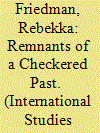| Srl | Item |
| 1 |
ID:
168815


|
|
|
|
|
| Summary/Abstract |
By examining the public discourse on Ravana that has been widespread among Sinhalese in the recent past, this paper suggests that the Sinhala nation is perhaps on the verge of being redefined. In comparison to the origin story of the Sinhalese that remained seriously unchallenged till the end of the twentieth century, in which the Sinhalese were considered the descendants of the Aryan prince Vijaya who arrived on the island around 2,500 years ago, this new narrative identifies the yakkha king Ravana as the originator of the Sinhala nation by going further back into the past. The paper also attempts to explain why this surge of interest in Ravana is taking place at this particular moment and not earlier.
|
|
|
|
|
|
|
|
|
|
|
|
|
|
|
|
| 2 |
ID:
161434


|
|
|
|
|
| Summary/Abstract |
I examine the ways in which female Liberation Tigers of Tamil Eelam (LTTE) experienced social reintegration—the processes through which cadres navigate their post-war identities and social relationships. Recent feminist work looks at women's participation in armed struggle as a transgression of traditional gendered norms and a form of political action. While this literature highlights female protagonism during war and female fighters’ capacity for political agency, I argue that it insufficiently examines female cadres’ personal, community-driven, and social motivations. Drawing on in-depth research carried out with female LTTE in northern Sri Lanka, I maintain that women joined the LTTE for a range of personal, social, political, and community-based reasons. Feminist scholars should further explore the personal side of agency. Going further, I argue that transformative reintegration needs to recognize and address the multifaceted reasons that motivate women to join armed groups. Recognizing the drivers of women's participation in armed groups is paramount both for female cadres’ transitions to civilian life and to facilitate positive social relations with their communities.
|
|
|
|
|
|
|
|
|
|
|
|
|
|
|
|